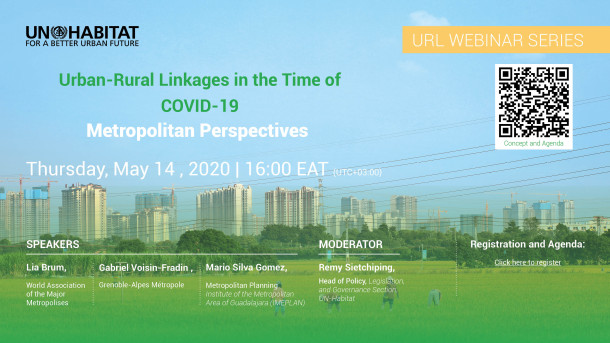INTERNATIONAL
CALENDAR
CALENDAR

Urban-rural linkages in the time of Covid-19: Metropolitan Perspectives
In light of COVID-19 pandemic, the UN-Habitat Urban-Rural Linkages project aims to exchange information and learn from the efforts of different actors to overcome this crisis and enhance post-crisis recovery actions by bringing a focus to urban-rural linkages and integrated territorial approaches. For this purpose, UN-Habitat is hosting the webinar series, Urban-Rural Linkages in the time of COVID-19.
The second session of this webinar series, Urban-Rural Linkages in the time of COVID-19: Metropolitan Perspectives, will provide an overview of the current range of COVID-19 response measures from the perspective of metropolitan areas and authorities through the lens of urban-rural linkages. This session will take place on Thursday May 14, 2020, from 16:00 to 17:15 East Africa Time (EAT) (UTC+03:00).
The main objective of the session is to learn about the role of metropolitan authorities and measures they are adopting to address the impacts of COVID-19 and discuss the effect of these measures in their territories on urban-rural flows of people, goods, services, resources and capital. Furthermore, the session aims to show the value of integrated and multi-level governance arrangements to manage resources across urban and
rural areas, as well as any challenges that these forms of governance are facing.
The opportunities to share and learn from metropolitan areas and their urban-rural interactions are crucial for metropolitan leaders, organizations, and different actors, in order to better understand responses within the crisis period and institutionalize the good practices emerging from this situation.
GUIDING QUESTIONS
- What are the characteristics of the metropolitan area at the territorial level? (e.g share (%) of rural and urban in the territory, share of the total population in rural and urban areas).
- What are overall COVID-19 response measures adopted in this territory (metropolitan area)?
- What actors and partners to metropolitan governments and other local authorities have been fundamental for the actions that metropolitan authorities are adopting in the face of COVID-19? Have rural actors been included?
- Have urban-rural flows been considered (of people, goods, services, resources, capital) in the measures adopted by metropolitan authorities in responding to COVID-19? Were these linkages considered before (e.g. there was in place a metropolitan policy for food, economic development, transportation, water, other services important for the COVID-19 response)?
- Have previous metropolitan policies been accelerated due to COVID-19 (e.g. transportation and digital solutions)? Which innovative actions and governance arrangements should be institutionalized for post-crisis recovery phase?
FORMAT
Virtual zoom meeting (around an hour and a half) limited to a maximum of 300 participants and 3 to 4 speakers. The session will allow a few discussants selected from the registered audience to comment (around 2 minutes) on speakers presentation to promote debate. The session will allow participants to share their comments through the chatbox. As time allows, questions and comments will be transmitted to the speakers by the moderators.
Selected speakers are invited to prepare 3-8 slides to discuss in 5-8 minutes their initiatives and experiences on the above-mentioned guiding questions.
Members of the Policy, Legislation and Governance Section, Urban Practices Branch, of the United Nations Human Settlements Programme (UN-Habitat), will provide the facilitation and moderation of the session. Following the webinar there will be a summary report with presentations and issues from the chat box presented online with other webinar outcomes in the series.
AGENDA
- 16.00: Welcome and Introduction
- 16.05: Opening Remarks: Remy Sietchiping, Head of Policy, Legislation, and Governance Section, UNHabitat
Speakers Presentations and Moderated Discussion - 16.10: Mario Silva, Managing Director of the Metropolitan Planning Institute of the Metropolitan Area of Guadalajara (IMEPLAN), Mexico
- 16.20: Gabriel Voisin-Fradin, Project Manager for International Economic Relations, Grenoble-Alpes Métropole, France
- 16.30: Lia Brum, Metropolis Observatory Officer, Secretariat General · World Association of the Major Metropolises
- 16.40: Moderated Discussion and Q&A
Wrap-up - 17-20: Takeaways and insights
- 17:30: End of the session
REGISTRATION AND CONNECTION DETAILS:
The webinar will take place via Zoom. Click here to register.

